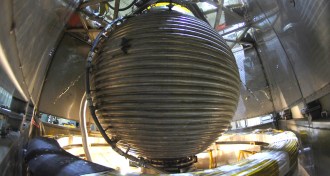Earth
Sign up for our newsletter
We summarize the week's scientific breakthroughs every Thursday.
-
 Climate
ClimateSouthwest’s monsoon season may heat up with the climate
Warmer temperatures may bring stronger rainy seasons over the long term, study finds.
By Erin Wayman -
 Life
LifeInvasive frogs may spread deadly amphibian fungus
African clawed frogs imported for 20th century pregnancy tests apparently communicate B. dendrobatidis to native species.
By Susan Milius -
 Oceans
OceansGlacier melt causes large fraction of sea level rise
From 2003 to 2009, thawing ice nearly as large a contributor to oceans as massive sheets at poles, researchers find in new analysis.
By Erin Wayman -
 Earth
EarthGroundwater isolated for eons
At least 1.5 billion years after it last saw the surface, flowing liquid may host life.
By Erin Wayman -
 Climate
ClimateWarming may not release Arctic carbon
Element could stay locked in soil, 20-year study suggests.
By Erin Wayman -
 Climate
ClimateCarbon dioxide in atmosphere reaches landmark level
At 400 parts per million, greenhouse gas concentration is now higher than it has been for millions of years.
By Erin Wayman -
 Earth
EarthJapan’s 2011 earthquake upped Tokyo’s risk
Chance more than doubled that capital city will soon experience big temblor, researchers calculate.
By Erin Wayman -
 Earth
EarthThe Arctic was once warmer, covered by trees
Pliocene epoch featured greenhouse gas levels similar to today's but with higher average temperatures.
By Erin Wayman -
 Climate
ClimateIce loss from Greenland’s glaciers may level off
Simulation suggests long-term effect on sea level not as dire as some predictions.
By Erin Wayman -
 Earth
EarthToxic waste sites may cause health problems for millions
Exposures to lead and chromium represent particular problems, study finds in India, Indonesia and Philippines.
By Erin Wayman -

-
 Earth
EarthSpinning the Core
Laboratory dynamos attempt to generate magnetic fields the way planets and stars do.